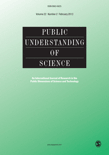
PUBLIC UNDERSTANDING OF SCIENCE
Scope & Guideline
Connecting Knowledge with Public Awareness
Introduction
Aims and Scopes
- Science Communication Strategies:
The journal explores various methods and strategies for effective science communication, emphasizing the importance of tailoring messages to diverse audiences. - Public Perception of Science:
Research on how the public perceives scientific information, including trust in science, understanding of scientific concepts, and attitudes toward scientific innovations. - Role of Media in Science:
Analysis of how different media forms (traditional and digital) influence public understanding and engagement with science, including the impact of misinformation and framing. - Crisis Communication in Science:
Examination of science communication during crises, such as pandemics or climate emergencies, and how these situations affect public trust and understanding. - Engagement and Participation:
Focus on public engagement with science, including citizen science initiatives and the role of various stakeholders in the science communication process. - Cultural and Societal Influences:
Investigating how cultural, ideological, and societal factors shape public understanding and attitudes towards science, including issues related to gender, race, and religion.
Trending and Emerging
- Misinformation and Trust in Science:
A significant increase in research addressing misinformation, especially in the context of the COVID-19 pandemic, and its effects on public trust in science and scientists. - Digital and Social Media Engagement:
The rise of studies focused on science communication through digital platforms and social media, exploring how these channels facilitate or hinder public engagement with science. - Climate Change Communication:
Growing emphasis on how climate change is communicated to the public, including strategies to counteract climate denial and foster public understanding of climate issues. - Public Health and Science Communication:
Emerging research on the communication of health-related science, particularly during health crises, and how public perceptions impact health behaviors and policy. - Diversity and Inclusion in Science Communication:
Increased focus on how diverse voices and perspectives shape science communication and public understanding, emphasizing the importance of inclusivity in science engagement.
Declining or Waning
- Historical Perspectives on Science:
There has been a noticeable decline in papers focusing on historical analyses of science communication, suggesting a shift towards contemporary issues and practices. - Focus on Traditional Media:
Research centered on traditional media outlets is decreasing as the journal increasingly emphasizes digital platforms and social media's role in science communication. - Niche Scientific Discourses:
Themes related to niche scientific topics or specialized discourses seem to be waning, possibly in favor of more broadly relevant and impactful science communication topics.
Similar Journals
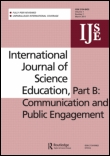
International Journal of Science Education Part B-Communication and Public Engagement
Cultivating a community of science communicators and educators.The International Journal of Science Education Part B: Communication and Public Engagement, published by Routledge Journals, Taylor & Francis Ltd, is a leading peer-reviewed journal dedicated to advancing research in the evolving fields of science communication and public engagement in education. With an ISSN of 2154-8455 and E-ISSN of 2154-8463, the journal has established itself as a key resource for researchers, educators, and practitioners interested in innovative communication strategies and engagement practices that enhance public understanding of science. It holds a commendable Q2 ranking in both the Communication and Education categories for 2023, reflecting its significant impact within academia—ranked 139th in Social Sciences Communication and 515th in Social Sciences Education based on Scopus metrics. Over its publication years from 2011 to 2024, the journal has provided a platform for scholars to share their insights and empirical findings, fostering dialogue and collaboration among professionals. Although it does not offer open access, it remains a vital source of knowledge, keeping stakeholders informed about the latest developments in science education and public outreach.

Frontiers in Communication
Innovating Dialogues in a Dynamic WorldFrontiers in Communication is a prestigious open-access journal published by FRONTIERS MEDIA SA, dedicated to advancing the field of communication studies. Established in 2016 and situated in Switzerland, this journal has quickly ascended to notable ranks, achieving a Q1 category in both Communication and Social Sciences (miscellaneous) as of 2023. With an impressive Scopus rank, positioning it in the 75th and 78th percentiles for its respective categories, Frontiers in Communication serves as a vital platform for innovative research, interdisciplinary dialogue, and the dissemination of knowledge in the rapidly evolving landscape of communication. The journal emphasizes accessibility and intellectual exchange, providing an open-access format that ensures unrestricted access for researchers, professionals, and students alike. By fostering collaboration and exploration across various communication frameworks, Frontiers in Communication plays a crucial role in shaping the future discourse within the field.
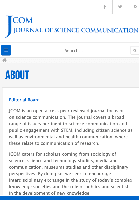
JCOM-Journal of Science Communication
Empowering Dialogue: Transforming Science CommunicationJCOM - Journal of Science Communication is a premier, peer-reviewed journal dedicated to enhancing the dialogue between science and society. Established in 2002 by the Scuola Internazionale Superiore di Studi Avanzati in Italy, it has become an essential platform for research in the field of science communication, reflecting the growing importance of effective communication in the advancement of scientific knowledge. The journal boasts an impressive Open Access model, encouraging widespread dissemination of critical research findings. With a notable impact in the Communication category, ranking in the Q2 quartile, and achieving a remarkable 77th percentile in Scopus ranks, JCOM positions itself as a crucial resource for scholars, professionals, and students alike. With a broad scope covering interdisciplinary aspects of science communication, the journal aims to foster innovative research and discussions that bridge the gap between scientific communities and the public. Located in Trieste, Italy, JCOM invites contributions that elevate the standards and practices of communicating science in an increasingly complex world.

Spontaneous Generations-Journal for the History and Philosophy of Science
Illuminating the Past to Understand the Future of ScienceSpontaneous Generations: Journal for the History and Philosophy of Science is a dedicated publication focusing on the rich fields of history and philosophy within the scientific domain. Published by the Institute for the History and Philosophy of Science and Technology, this journal provides a vital platform for scholars, researchers, and students to explore and disseminate ideas that bridge the historical context and philosophical inquiries of scientific practices. With its commitment to open access, Spontaneous Generations ensures that groundbreaking research is widely available, fostering an environment of collaboration and knowledge sharing. Aiming to engage a diverse audience, this journal is pivotal for those looking to understand the evolution of scientific thought and its implications on contemporary issues, making it an essential resource in the academic community.
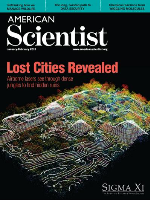
AMERICAN SCIENTIST
Your Gateway to Cutting-Edge Research.AMERICAN SCIENTIST is a prestigious multidisciplinary journal published by SIGMA XI-SCI RES SOC, renowned for its commitment to disseminating high-quality scientific research and insights since its inception in 1946. With an ISSN of 0003-0996 and an E-ISSN of 1545-2786, this journal serves as a valuable resource for researchers, professionals, and students alike, seeking to engage with current scientific discussions across various disciplines. Though it is not an Open Access journal, its articles are well-regarded in the academic community, evidenced by its Scopus ranking, placing it in the top 80th percentile among 88 multidisciplinary journals. Covering a wide range of topics, AMERICAN SCIENTIST aims to bridge the gap between science and the public by providing accessible writing that encourages informed dialogue around scientific advancement. With its extensive historical range from 1946 to 2016, it continues to be a critical platform for the exchange of innovative ideas and research findings that shape the future of science.

Tapuya-Latin American Science Technology and Society
Fostering Critical Insights into Latin America's Scientific LandscapeTapuya-Latin American Science Technology and Society is a pioneering journal published by Taylor & Francis Ltd, dedicated to advancing the discourse around science, technology, and society in the Latin American context. Since its inception in 2018, this Open Access journal has quickly established a significant presence, achieving a prestigious Q1 ranking in the Multidisciplinary category and a Q2 ranking in the Social Sciences (miscellaneous) category by 2023. With its focus on exploring the interplay between technology, scientific development, and societal dynamics within Latin America, this journal aims to foster interdisciplinary dialogues and promote innovative research in the fields of social sciences and technology studies. Researchers, professionals, and students will find valuable insights through its robust publication of peer-reviewed articles and critical analyses that span a range of topics, reflecting the rich diversity and complexity of the Latin American experience. Positioned as a vital resource for those committed to understanding and shaping the future of science and technology in the region, Tapuya continues to contribute meaningfully to academic and professional conversations.

Revista Eureka sobre Ensenanza y Divulgacion de las Ciencias
Enhancing Understanding Through Open Access KnowledgeRevista Eureka sobre Ensenanza y Divulgacion de las Ciencias is a premier open-access journal dedicated to advancing the fields of education and science communication. Published by the University of Cadiz in Spain, this journal has established itself as a vital platform since its inception in 2004. With an ISSN of 1697-011X, it aims to disseminate innovative research and pedagogical strategies that enhance the understanding and teaching of scientific disciplines. As of 2023, it holds a Q3 categorization in Education with a Scopus rank of #989/1543, reflecting its commitment to academic excellence and relevance. The journal's open-access model ensures that valuable research is readily available to educators and researchers worldwide, fostering a community engaged in the promotion of effective science education. With a focus on bridging theoretical and practical applications, Revista Eureka invites contributions that spark dialogue and inspire new methodologies in science teaching and dissemination.
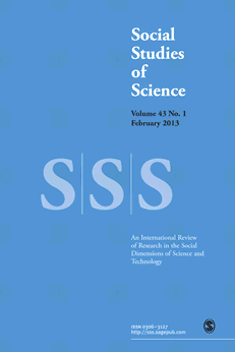
SOCIAL STUDIES OF SCIENCE
Charting the Intersection of Technology, Science, and SocietyThe SOCIAL STUDIES OF SCIENCE, published by SAGE PUBLICATIONS LTD, is a prestigious academic journal that has been at the forefront of interdisciplinary research since its inception in 1971. With an ISSN of 0306-3127 and an E-ISSN of 1460-3659, this journal serves as a vital platform for exploring the complex interactions between science, technology, and society. Well-recognized in the academic community, it boasts an impressive impact factor and is ranked in the Q1 quartile within major categories such as History, History and Philosophy of Science, and General Social Sciences, placing it in the top echelons of its field. Scopus rankings further emphasize its significance, notably achieving rank #9 out of 1760 in Arts and Humanities for History and a 99th percentile rank. This journal encourages Open Access for maximized outreach, although specific open access options are currently limited. The SOCIAL STUDIES OF SCIENCE is essential for researchers, professionals, and students alike, aiming to foster a deeper understanding of how scientific practices shape, and are shaped by, societal dynamics.

Tijdschrift voor Communicatiewetenschap
Unveiling the Nuances of Communication PracticesTijdschrift voor Communicatiewetenschap is a prominent academic journal published by Amsterdam University Press, specializing in the dynamic field of communication studies. With an ISSN of 1384-6930 and an E-ISSN of 1875-7286, this journal plays a vital role in disseminating high-quality research, theoretical advancements, and practical insights related to communication theory and practice. Despite its Q3 rank in the Communication category, it serves as a crucial platform for scholars and practitioners, striving to bridge gaps in knowledge and promote interdisciplinary dialogue. The journal's impact is reflected in its lineage of contributions from leading authors in the field. While the journal is not openly accessible, its curated content remains invaluable for researchers, professionals, and students eager to stay at the forefront of communication scholarship. With publications spanning from 2008 to 2024, 'Tijdschrift voor Communicatiewetenschap' continues to foster the development of communication sciences from its base in Amsterdam, Netherlands.

Everymans Science
Unlocking Knowledge for a Brighter Tomorrow.Everymans Science, with ISSN 0531-495X, is a distinguished journal published by the Indian Science Congress Association. Emphasizing a multidisciplinary approach, this journal aims to bridge the gap between scientific research and public understanding, making it an invaluable resource for researchers, professionals, and students alike. Although not currently an open access publication, it facilitates access to vital findings and insights that contribute to the advancement of science in India and beyond. Highlighting key developments across various scientific fields, including life sciences, physics, and environmental studies, Everymans Science serves as a platform for promoting innovative ideas and fostering collaborative research efforts. Its dedication to excellence in scientific communication ensures that it maintains a prominent place in the academic landscape, making it essential reading for those engaged in scientific inquiry and education.